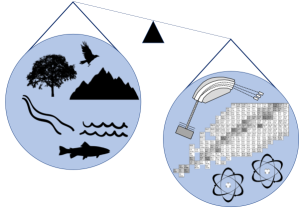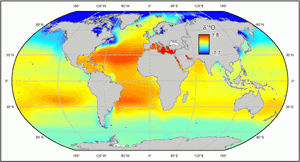Teaching
My education mission at GSO is to foster a sense of curiosity and drive in people to ask the questions that promote scientific and social progression, provide the knowledge and skills to find those answers, and leave people with an appreciation for their roles as stewards of our planet. This philosophy echoes the principles of URI as a vector for hands-on, experiential learning. At URI, I teach courses related to ecology, ocean sciences, and isotope geochemistry. I also teach marine isotope geochemistry in a summer short course on stable isotope ecology at the University of Utah.
In addition to traditional university education, our lab also promotes science literacy and ocean education through K-12 and public outreach. True scientific innovation begins with diverse perspectives, experiences, and approaches. It is my goal to ensure that everyone has equal opportunity to participate in scientific discovery.
OCG106G: You, Me, and Life in the Sea

This course explores human-marine organism interactions across diverse disciplines and perspectives, including: Microbes and Ecosystem Health, Phytoplankton Blooms, Ocean Exploration, Marine Debris/Plastics, Biopollutants, Fisheries/Aquaculture, Marine Conservation, Biotechnology and Bioprospecting, and Climate Change. This course is an interdisciplinary, general education course (A1, B4) with a Grand Challenges overlay for science and non-science majors.
OCG550: Environmental Isotope Geochemistry

This course covers fundamental concepts in the theory and application of isotope geochemistry to address environmental questions across the realms of the geosphere, hydrosphere, and biosphere. We discuss the distribution and fractionation of isotopes, learn about traditional and cutting-edge analytical methods, and explore applications of these concepts as tracers of important ecological and environmental processes.
BES550: Advanced Ecology

This graduate-level course focuses on interactions between organisms, populations, and communities with their environment. The course includes discussion of principles, methods of study, research results, and significance and relevance to conservation. This includes thinking about the history of ecology, the impact of racism and colonialism on who participates in ecology, and ways that we can decolonize ecology to make it a more inclusive and impactful field. The course is organized to encourage thinking and learning about key concepts in ecology from lectures and through reading of the primary literature, discussion, analytical writing, and problem sets.
Isotopes in Spatial Ecology and Biogeochemistry (SPATIAL Short Course)

The SPATIAL (Spatio-temporal Isotope Analytics Lab) Short Course is offered every June at the University of Utah. This course explores 1) current research themes in large-scale ecology and environmental Earth science, 2) theoretical and technical aspects of assembling and working with large, spatially distributed datasets, and 3) analytical and computational tools available to support such work. The course emphasizes stable isotopes as a research tool, and their unique capacity to address many ecological problems, but also stresses the integration of isotopes with other data types and methods within a geospatial framework.
